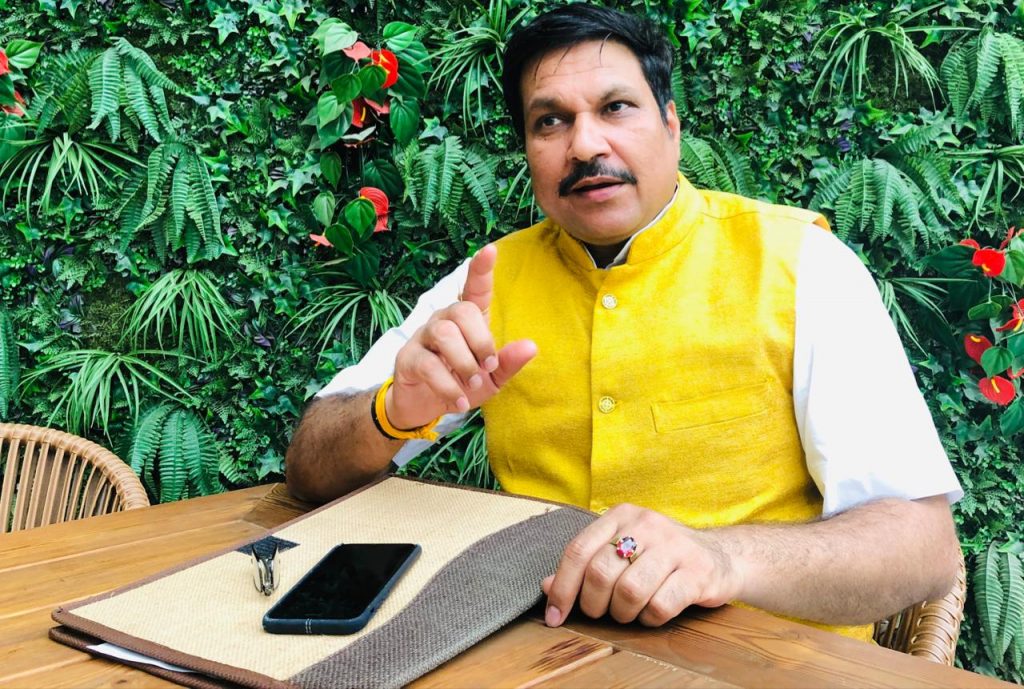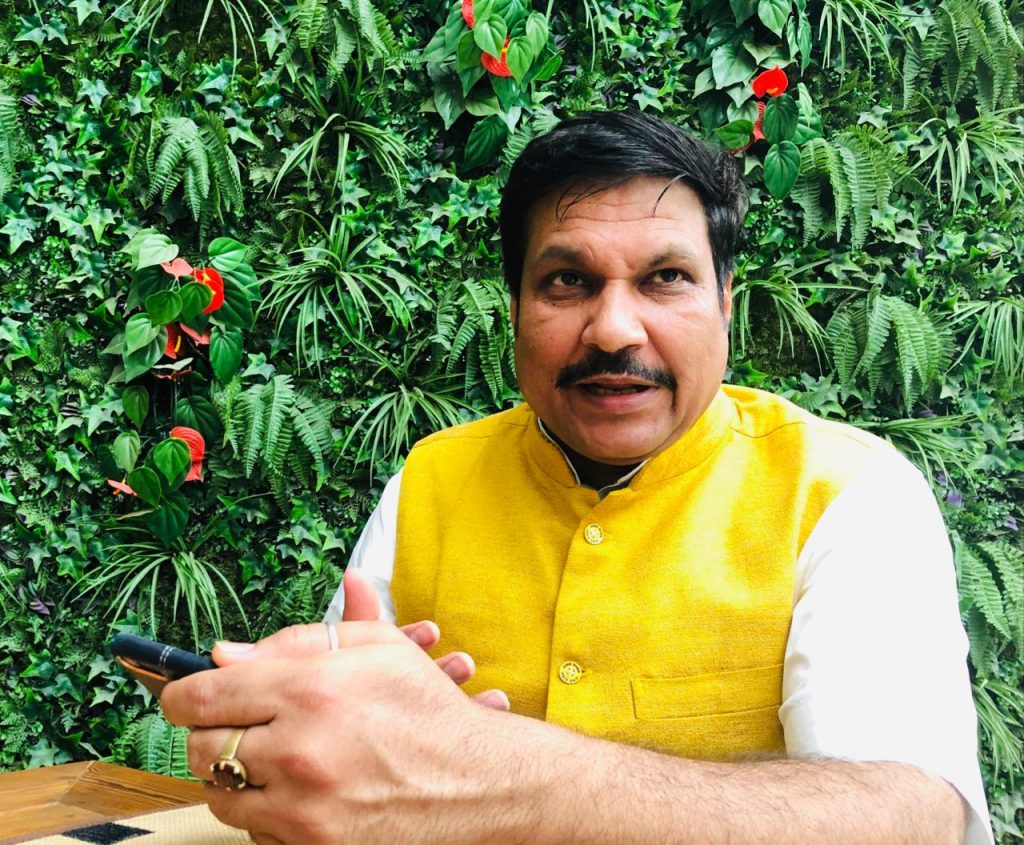An interview with Ganesh Malviya of the BJP on Union Budget 2019 – How the reformist and developmental budget was planned
We got Ganesh Malviya of the BJP to respond to the claims and the counterclaims and to give us an inside view of the rationale behind the budget. After the Union Budget was presented, there were supporters of the budget and there were others who labeled it as not being friendly to business. Here are excerpts of this exchange.

Overall, what would you like to say about the union budget presented by Minister of Finance Nirmala Sitharaman.
Ganesh Malviya: “Let me start off by giving you a background about the global economic situation. The IMF Data Mapper which shows the GDP growth of all nations places India in the second slot[1], which enjoys robust growth at 7.3%. The policies of the government are aimed at bringing in more long term growth to the Indian economy and are well planned to get within striking distance of becoming a 5 trillion dollar economy. We admit that the goal is challenging and that it entirely hinges on various factors. The first criteria according to various economists, is to ensure that GDP growth is maintained at 8 percent. This is the first step taken by this government towards fulfilling the dream of becoming the third-largest economy in the world. To achieve this economic distinction, it was important to achieve high growth, which needs to be supported by considerable savings, investments, and exports”.
Read Also: 2019 Indian Elections – Interview With Ganesh Malviya

The focus of the budget is on savings, investments, and exports. Your take on this?
GM: “The policies of this government as seen in the budget are to ensure high savings, investments, and exports. While this may appear to be easy, it demands planning and needs to negotiate the different challenges that emerge on the landscape. The tariff war between nations, the protectionist policies of various nations and the demands for a level playing ground are all factors that will determine the outcome of the government’s ambitious push for turning India into a global economic superpower”.
There are reports of lesser demand in the market. Is there a plan in place to boost demand?
GM: “Demand in any economy is typically driven by investment. Private investments have a powerful role in the economies and are the key determinants of capacity expansion, enhanced productivity, job creation, and the introduction of innovative technology. No economy can prosper without the participation of the private sector. We acknowledge the role of previous governments that helped in the nation-building process and the earlier governments are credited with creating a strong economy by bringing in liberalization. This has been acknowledged by global powers and has laid the foundations for the present growth. In my opinion, the policies of the previous governments have set the ball rolling, and the present government is poised to take this further to the next level. I would like to sum it up in one single sentence – Our priority is to achieve economic growth, create jobs and boost exports”.
Whenever there is talk of comparison between various economies, China is always the first example used by economists. Can India be another example?
GM: “Investments create jobs and this is best seen in the Chinese economy. China emerged as one of the fastest-growing economies by virtue of the investments. This helped to create jobs, which in turn created all-around demand and growth. The Indian economy needs to take a leaf out of this and help give a push that will catapult India into the category of the top three economies of the world. The government has made considerable progress in striking the balance between creating conditions that are conducive to capital intensive investments and labor-intensive investments. It is this visionary approach that is now helping the government to chalk out a plan of action”.

Do the effects of policies benefit at a later stage?
GM: “We are now witnessing a major push towards investments, and the government is also reaping the benefits of the policies and decisions taken earlier. The effects of investments are now visible through activity that is bound to increase as projects move into the next stages of development. The fruits of investment are typically experienced in economies when the activities related to the investments gather pace and move into advanced stages. Major international conglomerates invest and establish units in offshore locations, and the benefits of the investment trickle down into various sectors of the economy as the investment activity progresses through various stages. The government’s push for investment has began to show benefits on the ground and that this would help in creating more jobs for the youth of India”.
A major sticking point has been the NPAs of banks. Can you tell us how the government plans to plug that?
GM: “NPAs will forever continue to be a source of worry for economies all over the world and without exception, all governments have faced this problem. Willful defaulters and businesses that have fallen into hard times because of market forces or bad decisions have all contributed to high NPAs in India. The government has introduced measures to tackle this with various laws being passed in parliament to ensure that recoveries are effective and swift. This helps to recover most of the debt and help governments to function with lesser NPAs. While it is true that NPAs have been at an all-time high during the last few years, it is also true that NPAs are now witnessing a sharp decline. This is good news as banks will not have to wipe off bad debts and this is good for the economy”.
The farmers’ crisis has hit a tipping point India and as an agrarian economy, India depends on farm produce and farmers. But the condition for farmers has not been very good. What has the government done to set right this anomaly?
GM: “Despite the contribution of farmers, the sector has witnessed lesser benefits for farmers. Consequently, farmers began looking at alternate sources of employment, due to acute paucity of farmhands and laborers. The government has made a course correction and has helped to strengthen the hands of farmers with increased earnings. A slew of schemes including direct transfers to beneficiaries, subsidies and minimum support price have helped to increase the margins and the ability of farmers to pay more wages. This is bound to boost the sector and will continue to grow, helping the economy considerably. Better earnings, translates into demand for products, goods and services across all sectors and this is where the impact of increased wages will be directly experienced”.
Has greater political stability helped the government to take decisions?
GM: “I have to be candid about this. Previous governments have contributed to the economy significantly, but a major problem has always been the political instability that prevented governments from continuing policies or taking firm decisions. The need to satisfy coalition partners and accommodate various demands led to a push and pull factor that did not permit governments to act prudently. This has now changed, with the present political dispensation enjoying a clear majority. This helps us to continue its policies and take firm decisions in the larger interests of the economy. Loss-making PSUs are a drain on the exchequer and strategic sale will help to create more liquidity for the government. It will also benefit from the participation of the private sector and large business enterprises. This will help attract investments, create more jobs and boost the economy with demand. The plans of the government to become a global economic superpower by 2025 with a 5 trillion dollar economy can be possible only when certain decisions are taken in the larger interests”.
Are you happy that industry leaders have hailed the budget as reformist; including the focus of the government on the rural economy?
GM: “The government has always focused on the interests of small and marginal businesses and this is certain to help improve the conditions of a significant proportion of the population. This will create a trickle-down effect as more and more individuals move into higher income groups and spend, helping realize the dream of the government. Internal consumption needs a boost and this is where the government has taken the initiative of helping to create conditions for wealth acquisition. It is not just the exports that count, but also the consumption that makes the difference. The government’s clampdown on eCommerce players is intended to create a level playing field for small-time sellers and offline traders. This will help many to earn more profits and move into higher income groups, thereby boosting consumption. More regulation is required to create better conditions for small-time traders, while the e-commerce sector needs to be monitored to ensure that stakeholders are not taking unfair advantage”.
There have been reports about a slowdown in the economy with reduced consumption in the automobile sector and housing. What are the government’s efforts at tackling this situation?
GM: “Consumption has the positive effect of creating demand and expanding capacity. One of the biggest problems that ail economies is the under-utilization of capacity and lack of opportunities for creating additional capacity which in turn creates demand. It is cyclical in nature and this is precisely why the government has been focusing on creating and utilizing capacity. The forward-looking budget has provided adequately for healthcare and education. The government has earmarked around 100 lakh crore for infrastructure projects and this will help boost the economy with long term results. While the results may not be visible immediately, the impact will be felt over a longer period as the benefits of infrastructure are permanent in nature. The government has established a committee of experts to identify the specific areas of infrastructure spending that is required. The committee is also empowered to look into the financial aspects of the initiative – the funds required for the projects. The initiatives taken by the government to attract investments and the establishment of manufacturing units are a push in the right direction”.
How are the efforts on boosting infrastructure working?
GM: “The focus of successive governments has always been on boosting infrastructure. The sentiment has been carried forward and different sectors have lauded the policies of the government. Real estate, cement, and steel sectors are drivers of employment. The effects of growth in these three sectors are typically experienced in multiple areas and industries. This helps create employment opportunities and drives consumption. The reduction in taxes for home loans in the affordable housing sector is a masterstroke as it helps drive demand and boost the sector wither greater participation”.
It was a pleasure to interact with you. Can you wrap this up with concluding remarks on the budget?
GM: “This budget is the beginning of a journey to transform India into a global superpower. India is well on track to come as close as possible to the 5 trillion dollar economy that it aims to become by 2025, and the union budget of 2019 is the first in the right direction”.
[1] https://www.imf.org/external/datamapper/NGDP_RPCH@WEO/OEMDC/ADVEC/WEOWORLD
